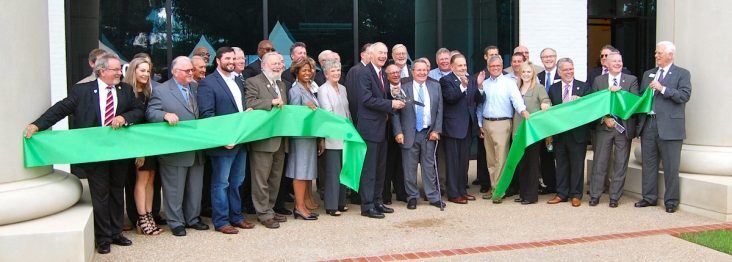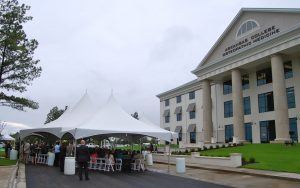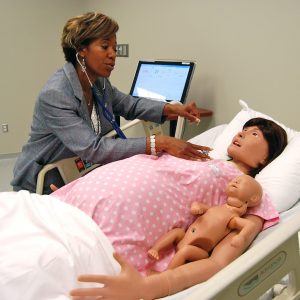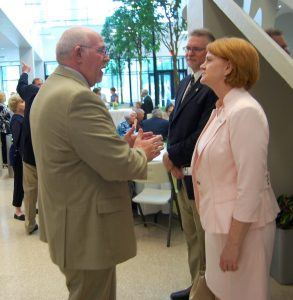Arkansas College of Osteopathic Medicine opens, Gov. Hutchinson says it will help meet a ‘priority need’
by August 20, 2016 2:44 pm 1,152 views

Gov. Asa Hutchinson (center) cuts the ribbon during Saturday’s (Aug. 20) opening ceremony of the Arkansas College of Osteopathic Medicine.
Hundreds gathered Saturday morning (Aug. 20) for the formal opening of the Arkansas College of Osteopathic Medicine, with The Degen Foundation Chairman John Taylor saying the facility has the “potential to change thousands of lives.”
Work began in February 2015 on the $32.4 million facility located in the Chaffee Crossing area. The school will be housed in the three story, 102,000-square-foot building, and a fully operational osteopathic college is expected to serve about 600 students. Each class will have 150 students.
The college is part of the Arkansas Colleges of Health Education (ACHE), which was created with primary support from The Degen Foundation, a Fort Smith-based philanthropy created with some of the revenue from the 2009 sale of Sparks Health System to then Naples, Fla.-based Health Management Associates. As of June 30, 2015, The Degen Foundation reported assets of $74.843 million, with $63.629 million restricted for ACHE. The college also has received a $14 million anonymous donation and has access to a $25 million low-interest loan.
Taylor said in his Saturday morning remarks that the plural “colleges” is a clear signal the osteopathic college is just the first venture.
“In Oklahoma and Arkansas lingo, that means, ‘You ain’t seen nothing yet,’” Taylor said.
He also said the building is “spectacular,” but “what’s going to happen inside the building will be even more spectacular.”

The American Osteopathic Association Commission on Osteopathic College Accreditation approved in April the college for student recruitment. Officials with the osteopathic college began hiring faculty and staff to prep for the first class arrival in the fall of 2017. Kyle Parker, president and CEO of ACHE, said Saturday there are about 30 on staff, and by August 2017 there will be around 100 faculty and staff. Initial planning estimated that the new college would employ around 92 (full-time equivalent jobs) with an average salary of $116,000 – not including adjunct professors and other part-time support.
It will be the second osteopathic school to open in Arkansas. The NYIT College of Osteopathic Medicine recently opened its school on the Arkansas State University campus in Jonesboro.
Gov. Asa Hutchinson attended Saturday’s opening, and outlined three points about the college. First, he said the ACHE is “addressing a priority need for the state of Arkansas,” by producing more doctors. Second, he said the “unique community funding” that did not rely on tax dollars reflects “the vision of the leaders in this community saying, ‘We can do it.”

The third point was the economic impact the ACHE will have with the osteopathic college and future expansions. Part of that impact happened a few days earlier. On Aug. 9, officials with ACHE and Mercy Clinic-Fort Smith broke ground on a $7.9 million, 13,500-square-foot clinic near the new college. The clinic will feature 28 exam rooms, X-ray, triage, and laboratory and conference space to accommodate training requirements of the medical school’s residency program.
The ACHE board has bigger plans for the more than 220 acres owned by the organization. Roughly half of the property is in Barling, and the other half in Fort Smith. Unique urban development that blends commercial and residential development has been teased as a future project.
In an interview with Talk Business & Politics after the opening remarks, U.S. Sen. John Boozman, R-Ark., said the college will “do a lot” in the way of improving quality of life and giving individuals and businesses a reason to live or locate in the area.
“And that’s what this facility is really all about,” Boozman said.
Following the opening remarks, the several hundred guests toured the building, which for many involved meeting “Michael” and “Lucy.” Michael is a lifelike robot in human form, anatomically correct down to his ability to receive Foley catheters. He is part of a “high-fidelity simulator” that includes cameras in the ceiling, intricate wiring, and software that can manipulate every part of his health – from sniffles to strokes – for $2.5 million. Lucy is a pregnancy simulator whose mother-and-child robots cost about $150,000 combined.

